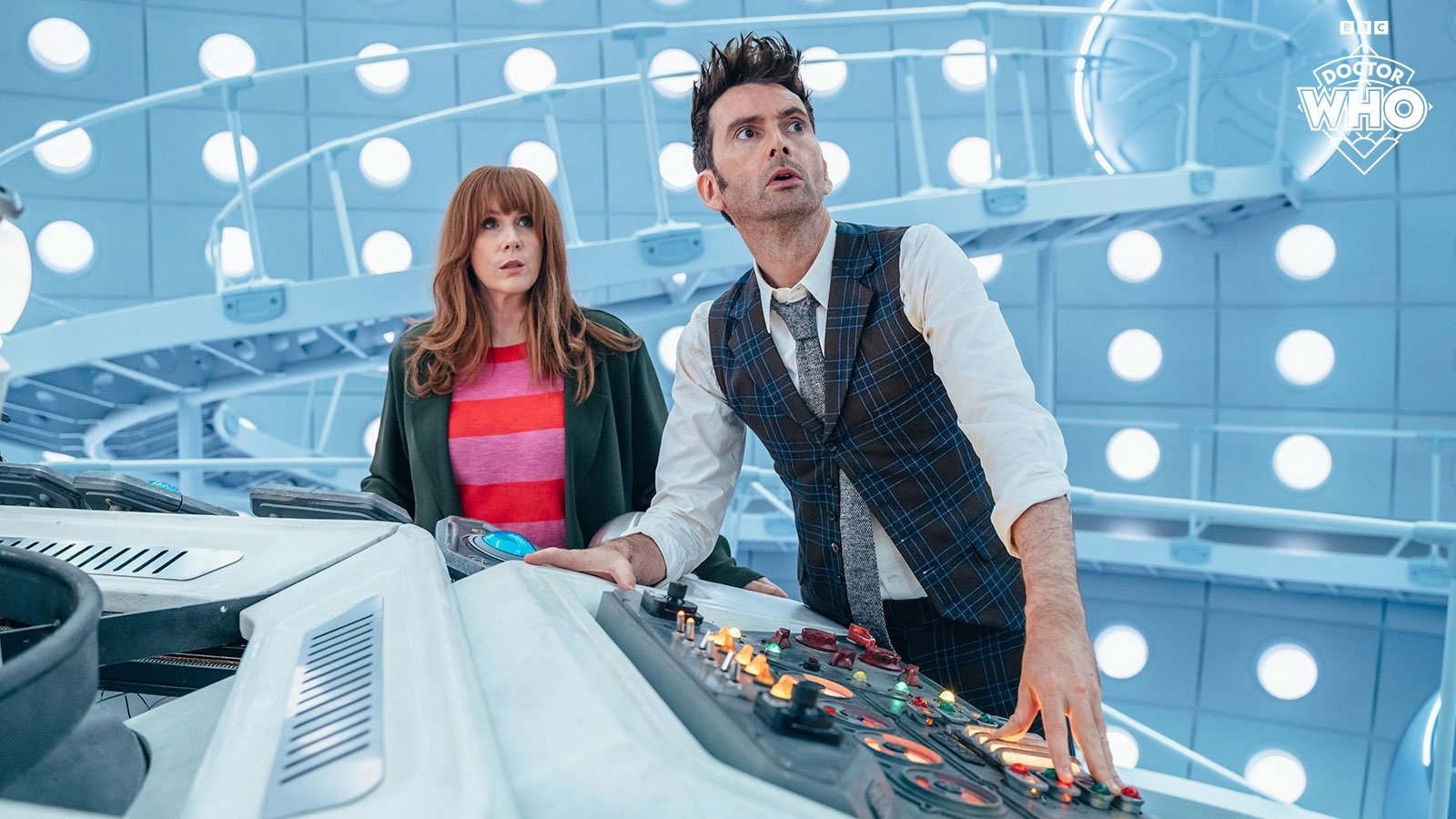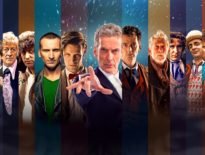With a new era fast approaching and the last still hot on our lips, now feels good a time as any to do like the Fourteenth Doctor and take the time to think some of that through. The last month has seen something truly ground-breaking for Doctor Who by having a production team that started a whole phase of the show’s history return to bookend it and launch something considered separate and new to what came before. It would be the equivalent of Verity Lambert returning to write the coda on classic Who with her take on Survival before sitting down to work on The TV Movie the following month. Some may disagree with the idea of another new Season 1 as a matter of principle. They would be right to say that, unlike the end of the McCoy Years and the Wilderness Years that followed, there is no true gap between the two as there certainly was when Series 1 launched in 2005. The format this time also appears to be largely the same, albeit with fewer episodes each season and a determination not seen before to ensure regular outings each year. But what is abundantly clear both from the statements of the new team and what we saw narratively towards the end of The Giggle is that this is a new era by design.
The Third Great and Bountiful Doctor Who Empire begins here, like it or lump it.
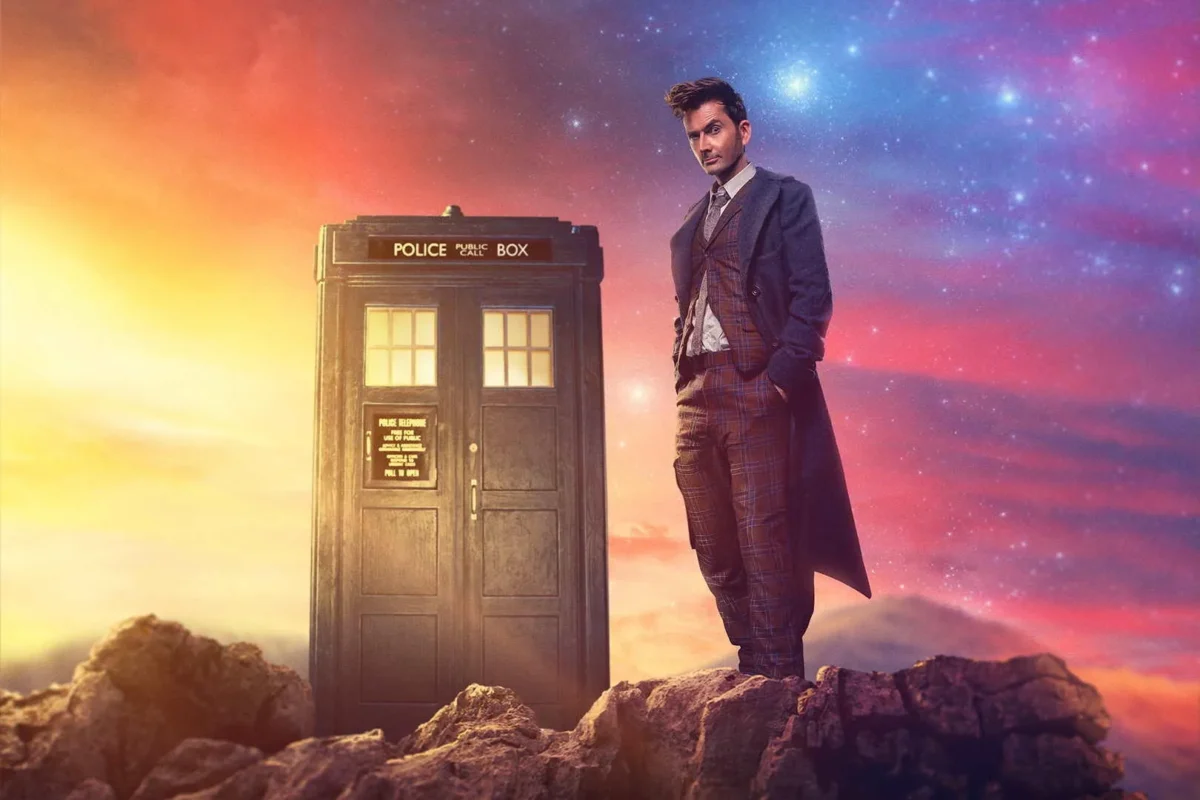
The Giggle ended the ‘Nu Who’ era of the show with bombast and, once again under the stewardship of Russell T Davies, no shortage of controversy. The tone of a 21st Century show written by Russell T Davies (It’s a Sin) shouldn’t have come as a surprise to anyone paying attention but his journey from ‘Doctor Who Saviour’ to ‘Doctor Who Destroyer’ amongst the darker and more embarrassing members of our fandom has been particularly quick and decisive this time around. The trio of Tennant-led specials en masse proved to be a smorgasbord of tastes with both fans and general audiences too. Critical reviews, discourse on Twitter, lengthy debates on The Doctor Who Companion itself (my email notifications continued for days after I’d chosen to exit the discourse) and from viewers I know personally seem to provide a consensus that most have liked at least one of them, and that many have strongly disliked at least one of them too. There seems to be a fairly even distribution of which individuals consider to be the good episodes, which tells us a lot about them by itself.
Lucky enough to avoid any feeling that could described as strong dislike or anger thus far, I’m pleased to say that I found enjoyment within each of them to different degrees. That’s not to suggest I can’t see where those that do find things to dislike are coming from though. Gratefully, unlike the previous era where quality often felt far from assured, the standard of these was largely high from a production and writing point of view. Other than some criticisms of deux ex machinas (nothing particularly new from Davies or Doctor Who in general there, it must be said), clunkiness in The Star Beast, and some (unjustified in my opinion) unkindness about the quality of the CGI in Doctor Who’s first wholly green screen endeavour in Wild Blue Yonder (did they not see the 1970s blue screen equivalent to compare?), most of the polarisation has appeared to come from what the stories did wrong narratively rather than the style and finesse by which they went about it. Russell has of course been far from subtle with his messaging early on and far from hiding from controversy (as many hoped he would) has appeared to gleefully flirt with it at every turn, both socially and in the way he addresses and changes Doctor Who lore. My initial reaction following the conclusion of The Giggle was that it had more to say than the other two combined. The depth of ideas and themes made it a real thinker and also the most worthy of the mantle of the 60th anniversary banner.
That’s not to say that any of the three were perfect or even good storytelling at times. Whilst the nuance seen early in The Star Beast was beautifully done and will hopefully educate many on what trans experience must be like, the later stages of the episode did occasionally creak under the weight of the message which was being delivered. We’re fairly used to on-the-nose storytelling on the back of the Chibnall era but the ending of this story would have made even him blush at times. But that’s not enough to make it a bad thing. It was a discussion starter. Many will have discussed it since — people who may have either disliked or felt alienated by the idea of trans identity for fear of the unknown or who may have been scared to discuss it for fear of rebuttal. Mothers and fathers will have seen the acceptance offered to Rose from her loving family. It may have shown them the way to be in those situations. It may save lives. It’s sometimes easier to remain silent on things which we don’t fully understand for fear of getting it wrong or sounding silly or stupid. It’s important for these stories to be told to allow these discussions and to find ways for society to move forward. The fact is that the first mainstream ‘issue’ stories most often are on the nose. When Cathy Come Home came out in the 1960s, it was hardly subtle about addressing the welfare state. EastEnders, which has usually existed somewhere between the deplorable and the exquisite throughout its long history (often in the same episodes), has tackled gay relationships, teenage pregnancies, historical child abuse, rape, HIV, stillbirth, and dozens of other challenging topics over the decades and almost always with broad, obvious, and performative (though occasionally incredibly well researched) storylines. They don’t have to be delicate to be important or powerful. They exist to break the ceiling on what can be done or said and to allow more nuanced stories to run where they initially stomped. None of those stories had Twitter (or X, if we must) to contend with, and largely they all benefited from that. It will be hard to put that particular genie back in the bottle unfortunately.
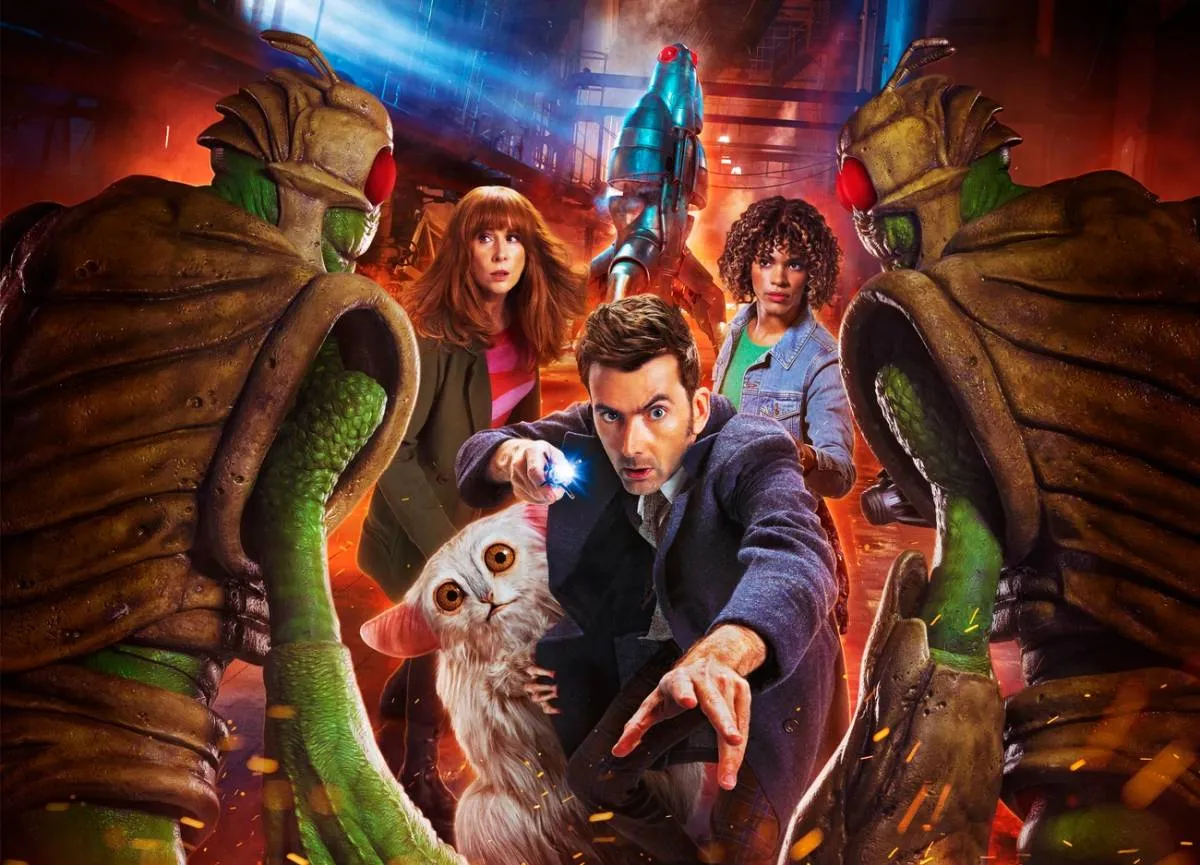
The Star Beast and The Giggle were strong modern-day parables about the way that we treat each other. The first dealt with what it felt like to be different in the 21st Century, while the latter addressed how difficult it has become to have challenging conversations within the last few years. I found myself in a self-reflective state on upon the conclusion of the latter, asking myself why the potential backlash to the first should worry me more than the other. For those still who somehow missed it, The Star Beast dared to take on the complex as you care to make it issue of trans existence. Visiting my in-laws in Northern Ireland between specials one and two, it didn’t take so much as the car journey from the airport to hear remarks about the wokeness of a trans character appearing in ‘even Doctor Who’. It made waves and I’ve no doubt that was completely the intention. If RTD is reporting correctly and the story has so far been seen by over 9 million worldwide since broadcast, then it’s done the show no harm at all and may well have had many of those viewers and more talking.
While there’s a perhaps a nuanced discussion to be had on when or even if sci-fi should be the medium for such home based discussions, I’d be quick to call such thinking out on a base level at least. Sci-fi exists as a medium on the backs of those who wanted to teach modern lessons to societies without threat of abuse, punishment, or imprisonment from their governments. Animal Farm, The Strange Case of Dr. Jekyll and Mr. Hyde, Frankenstein, Brave New World, and The Handmaid’s Tale would never have flown over the heads of those they satired and critiqued if they had been told in common terms. They would never have been successful and so, we would never have learnt from them. While traditionally sci-fi has admittedly handled the outstanding and large while soapboxes handle the minutiae, it was Doctor Who and Davies himself, following the strong example of the USA’s Buffy the Vampire Slayer, who in 2005 realised that the most effective way to make sci-fi saleable to mid-noughties British audiences was to make them more human and family-driven. It really shouldn’t have come as a surprise that he’d continue where he left off when he came back.
The second special was more traditional Doctor Who fare than the others and mirrored well against past adventures like Midnight and to a lesser extent Heaven Sent. It will both live and die by those comparisons, and by how one felt about the larger-than-life special effects. In it, we saw an open and closed monster story which allowed both the Doctor and Donna to exorcise some personal demons. The excellently performed short scenes where the Doctor acknowledged the harm of the Flux and the Timeless Child may have been as meta as it gets for critics of the previous era, though I do think their inclusion helped give weight to the bygone narrative somewhat as well.
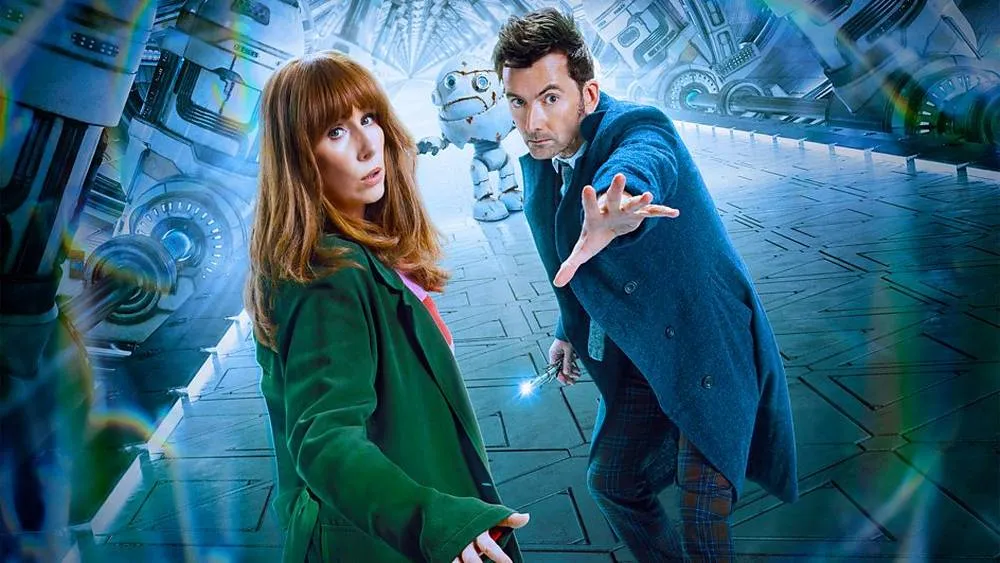
It was otherwise completely inoffen… you what? They cast a person of colour as Isaac Newton, a historically confirmed pasty Caucasian? Get my lawyer on the phone! I jest of course. They had to do something to raise Tory blood pressures that week and I’m glad it did the trick. I’ve asked Isaac about it, and he said he was fine with artistic interpretation but wanted the record correcting on one or two matters: he was 44 at the time he discovered mavity and felt that Curtis was far too young for the part. And at a whopping 6’5 he felt that he was far, far too tall. ‘Well, Isaac’, I said. ‘Don’t you worry. You know what they say? What goes up must come down!’ I’ll get my coat.
In the hours and days that followed the third special, I had a few questions to consider about myself too. Why did I allow my enjoyment of the first episode to be affected more by what people may have thought than I did the third? Both had very strong things to say and the latter is, if anything, more direct with its criticism of so many of us. The revelations ‘in Whoniverse’ are arguably even more disagreeable for some. To address the societal implications first, I think it comes down to this. Sad though it is, everyone will take some positivity from The Giggle’s message about society, even if they differ on what they feel that message was. At the present time, as the episode satires, many do take up regular battle stations about ‘big issues’ saying the unsayable without regard (usually from behind a screen). And society does feel divided by buzz issues that would not have been as inflammatory as they are now a few years ago. Amongst the many hateful anonymous keyboard warriors, there are noteworthy examples of public figures and politicians who make the anger feel far worse and who normalise it. The rabbit hole of the now repetitive and well-publicised discourses that dominate the national consciousness (but seemingly very few of our actual lives) appears to be all consuming for many and the ‘issues’ seemingly grow to define those that spend so much time in a fury about them.
Regardless of what side of angry debates these incredibly dedicated few decide to spend so much of their spare time fighting for, they, as the episode portrayed so correctly, do indeed believe that they are absolutely right and that the ‘other side’ is absolutely wrong. Both will likely take a false solace from the episode’s message against cancel culture and a world where nobody will listen to them. Those of us in the middle will sadly nod at the accuracy of the statement. I realised that criticising a fundamental issue of 2020s life and our seeming inability to have grownup discussions anymore is a less controversial thing to talk about than the first special’s stance that trans existence is valid. That’s a hell of a thing.
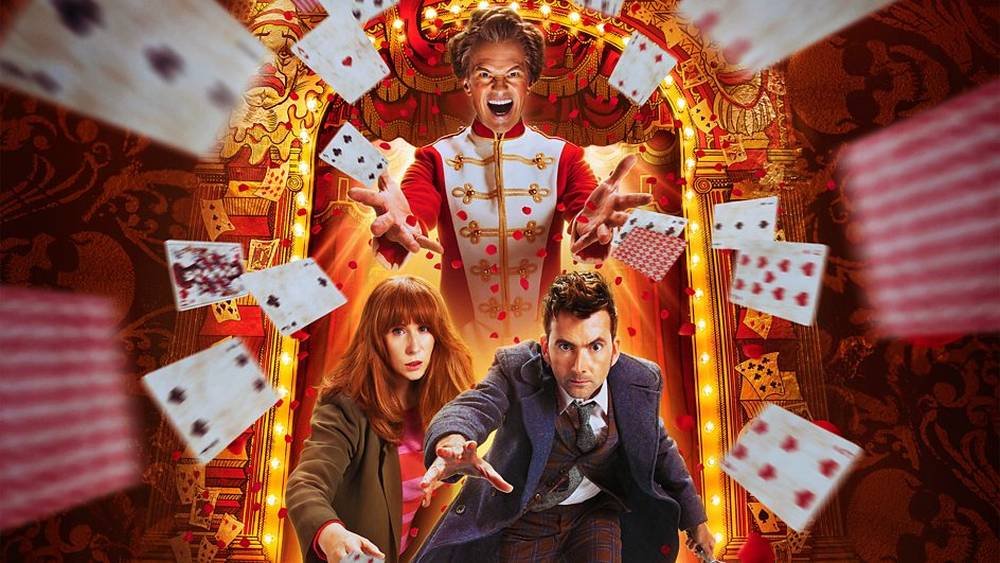
Acknowledging that cancel culture and mob rule are a symptom of both extreme sides’ inability to listen should tell us that we’d be more sensible to take a more nuanced and calm view of the things that make them so angry. And that we shouldn’t let them dominate our airwaves or discourse. Unwrapping it too much and too openly, however, can place one directly in the firing line and few want to risk entering these battle zones. Very few are brave enough to be the first out of the trenches. Many have jobs which would make doing so a significant risk. That is, unfortunately, where we are. Most seem to share a good understanding of the problem but are afraid and frustrated about how to combat a discourse so openly hostile. Sadly, we don’t have a UNIT-sanctioned laser beam to magically solve the issue for us in real life. But in both cases, at least Doctor Who has given us a reason to think and talk about it.
The story of The Giggle itself is hurt most by an overabundance of ideas that I don’t think necessarily played well together on first viewing. In that respect, it’s arguably the closest thing to a Moffat script that RTD has ever delivered and, like with a lot of the Moffat’s best work, it often serves the viewer better on repeat watches. It was fantastically written, produced, scored and, especially, shot and directed. The emotional scenes all hit, the transitions were excellent, and the scary scenes in the Toymaker’s realm were the first thing my partner felt the need to shield our young daughter’s eyes from in her short, but inevitable, journey as a Doctor Who fan (or Doctor Do as she currently calls him). The story was well paced and the special effects were all excellently rendered. The Toymaker scenes in the second act are potentially the most out-there Who has ever been, as was the Spice Girls dance sequence. I’d compare the design flourishes in places to the beautiful artistic direction of Star Wars‘ The Last Jedi compared to the rest of that series, though thankfully the story beats and pacing were far less contentious.
If The Giggle’s initial threat was a parable for society, the conclusion (and specifically the Fourteenth Doctor’s ending) may have been a one aimed squarely at fans of the show. The message would appear to acknowledge how difficult things have been lately and kindly suggests that we find time to process our own strong feelings about the series. It works to an extent because we do appear to have ‘suffered’ for our love of Doctor Who for a long time. I’ve never been active within a Doctor Who fanbase that hasn’t been fiercely divided about what makes the show good or important. Footage of Panopticon conventions in the ’80s and ’90s and negative quotes in fanzines about 1976’s The Deadly Assassin would seem to prove this has gone back much further.
The idea that the Doctor has been through so much and never allowed himself to look back offers an interesting contrast to the fanbase too as we rarely appear wholly happy in the moment watching the show and often feel the need to look back to what has been for validation on what it should be now. Often, this even extends to how fans view themselves as well. ‘Who am I without the toys?’ the Doctor says. Who would we be without Doctor Who? I admit I find fixation on how good it used to be particularly self-defeating. I can reflect on how the 13th and 14th Seasons of Classic Doctor Who and the 4th and 5th Series of Nu Who were the best the show has ever been until the cows come home, but it’s only to my benefit and to those my who my view equally validates.
I’m not saying we shouldn’t talk about or remember our favourite stories. Far from it — if it brings us joy, and it often does, then there’s no problem with it. But if it’s getting in the way of how we or others enjoy what’s coming out now then I think it’s far from helpful. Nothing will bring those times back and neither will new stories stop them existing. It’s why I continue to refuse to get hung up on the Timeless Child. The older stories are not under threat. They’re mine and yours (if you want them), unedited and unchanged, and they will be forever. This story seems to want to persuade us to take the time to digest our memories and, like the Doctor, deal with our feelings to allow ourselves to move forward. The alternative is fixating and allowing it to define who we are today. It’s a healthy message for both those looking ever forward for fear of looking back and for those stuck in the past that made them. Its most potently a fundamental reflection on who the Doctor has been since 2005, with the ever-present desire to hold onto the past while creating new relevance often stopping Doctor Who from being as creative as it was in the long gone past.
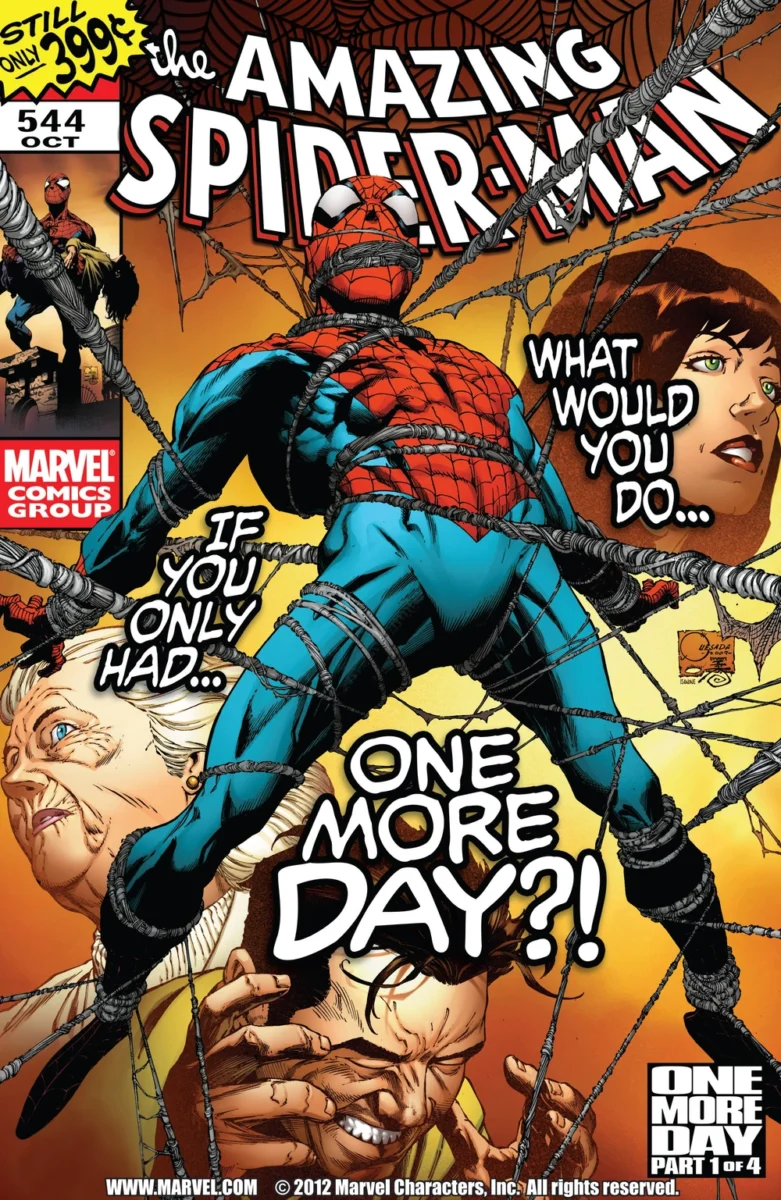
In 2007, Spider-Man was in a place so continuity bound that the executives at Marvel felt it had lost much of what had made it the sensation it had become. For this reason, they gave the series a soft reboot with a story called One More Day. The story was known internally to be so controversial a concept in its inception that the chief editor, who wrote irregularly at the time, wrote it himself in order to take the flack. It was widely panned by critics and caused absolute uproar within the Marvel fanbase. A deal with Mephisto saved Peter’s Aunt May after she had been shot and restored his secret identity at the cost of… pretty much everything else. Spider-Man, long married to Mary Jane would now be single. How dare they? Decades of storylines were thrown under the bus. How abhorrent. The creative team apparently considered it a necessary move as it allowed them to trim all of that baggage (not just Mary Jane for the record; she returned in due course) to tell more exciting stories moving forward. The ending of The Giggle will certainly prove divisive too, and I’m still unclear about how a feel about the Fourteenth Doctor remaining on modern day Earth (more on that later), but Ncuti will be a more level, more balanced, less tortured — in other words a more ‘classic’ Doctor than he’s been allowed to be in the last 20-odd years due to this decision. I think it will be a good move. Just as RTD once invented a trauma through the Time War to allow his new Doctor to display pain and angst, this will do well to allow his current Doctor to exist without it for a while. Once again Tennant can be the Doctor who regrets while this new one can, more fairly this time, afford to forget.
If I had one major issue with The Giggle when it aired, it was how much it left unexplained. I shouldn’t need to refer to commentary tracks, regardless of how well sign posted they are, to fully understand a new concept which should have been explained on screen. Just as RTD’s comments on Davros were more difficult for many of us to process than the recent Davros appearance was itself, his words here will likely cause many more ripples than the episode itself going forward. I think this is perhaps done on purpose, but that’s not a great excuse in terms of effective storytelling. I wasn’t left with the impression that these will be things particularly addressed immediately (if ever) on screen. Leaving gaps for others to fill or reinterpret along the line may well be the smarter move long term, when compared to something overtly clear and difficult to misunderstand or rewrite, like the Timeless Child. The implication of his words outside of the episode itself will allow fans room to reconsider continuity. We were the target of his words and we’re the only ones who care about making things work or fit. But I like my stories to speak for themselves and I do see it as a negative for the episode itself.
For casual viewers who don’t care about pesky timeline alterations, it must be said that bi-regeneration doesn’t require a lot of further examination to allow them to continue to enjoy the story into the new era. It happened; it, we were told, had been a mythical something the Doctor already knew about that then happened to have happen to him. Is this, like the Toymaker’s appearance here, something that was allowed to happen due to the invocation of salts on the edge of space and time? Would this have happened differently otherwise? What other doors may have been opened this way if so? All are good talking points but straightforwardly, it doesn’t break any rules or contradict anything. Bi-regeneration was always there, we just hadn’t heard about it before, like so many things before. Sure. Let’s roll with it. It was nice to meet the Fifteenth Doctor a little early and it, in a way, maintained the ‘multi-Doctor in an anniversary’ theme well, while offering a vastly different take on it.
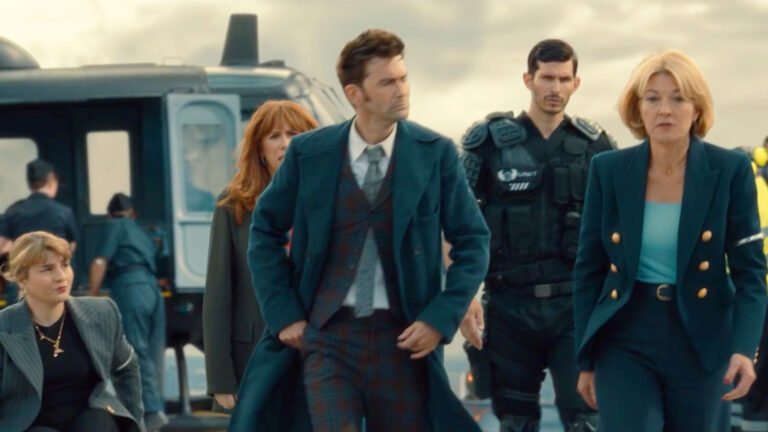
The specials went to great lengths to introduce us to what would appear to be an ongoing supportive cast. I found comparisons to the introduction of this new UNIT reminiscent of their initial introductions in The Web of Fear and The Invasion back in the 1960s. We had a couple of notable but effectively nameless soldiers in the shape of a Benton or a Yates as well as meeting our new central team. Kate Stewart, back once again, was joined in these specials by new Scientific Advisor Shirley Anne Bingham and her alternate universe bestie Mel Bush, or Melanie-Mel for all of you Hebe Harrison stans out there. No, I’m not going to explain it. You all have Google and Big Finish accounts, right?
Kate was great in this story. Arguably as great as she’s been since her 2013 introductions in The Power of Three and The Day of the Doctor and at least since her Cyberman mic drop in Death in Heaven, Jemma Redgrave was finally allowed to perform in the way we know she is capable. Kate’s slowly equalling her father’s tally for Doctor collecting (The Brig met Doctors One to Nine if you include expanded media) and she’s now met Doctors Eleven through Fifteen face-to-face. Her best moment here was the brief but powerful moment that she wasn’t herself. The hate and evil that she spouted while out of control should reground us somewhat when we’re thinking our wildest thoughts, or assume prejudice is something that only other people possess. If that’s a negativity that can be unleashed in an unthinking Kate Lethbridge-Stewart, immaculately raised, and educated, and one who’s dedicated her life solely to the protection of others, what atrocious behaviour must we all be capable of when we abandon thought and decency? She became the person The Daily Mail, The Sun, and The Telegraph want us to be in that moment, and it reminds us why it’s important for someone in her position of power to be so reserved and considered in their approach.
Shirley and Mel were welcome additions for different reasons. Even after two specials, I feel we’ve barely scratched the surface of Shirley. Her display of Bond-esque heroics in episode one was matched by her savviness and resolution in episode three. Mel’s return admittedly felt rather more shoehorned in. I’ve found little valid story reason to why she of all companions should or could be there, nor anything within her onscreen back catalogue which would make fans desire her of all companions to return. Furthermore, while the intentionally simplistic ‘just because’ reason we received on screen did, at least, do well to remember that Mel wasn’t initially dropped in 20th Century Earth when she left, it becomes more confusing when you know that she returned to travel with the Doctor after she left us on screen. She had many further adventures in books and on audio, the last of that long arc coming out as recently in 2018. Her most recent work with Big Finish came out this year, albeit stories set in an earlier place in Mel’s personal timeline. It’s nothing new for TV to ignore expanded media of course but does bear particular mention in this case as those stories (and Bonnie’s performances in them particularly) are what endeared Mel to us and made her likable, or at the very least bearable, in the first place. My reception to her coming back was infinitely softened by these stories to the point of being glad to see her return again in The Power of the Doctor last year, so it seems a little strange considering how much Langford has put into to rehabilitating the character in the last 23 years to so freely cast that all away. Like with many aspects of this story, little thought will have been given to expanded media, and that is a shame even if I do realise how few people it will relatively affect.
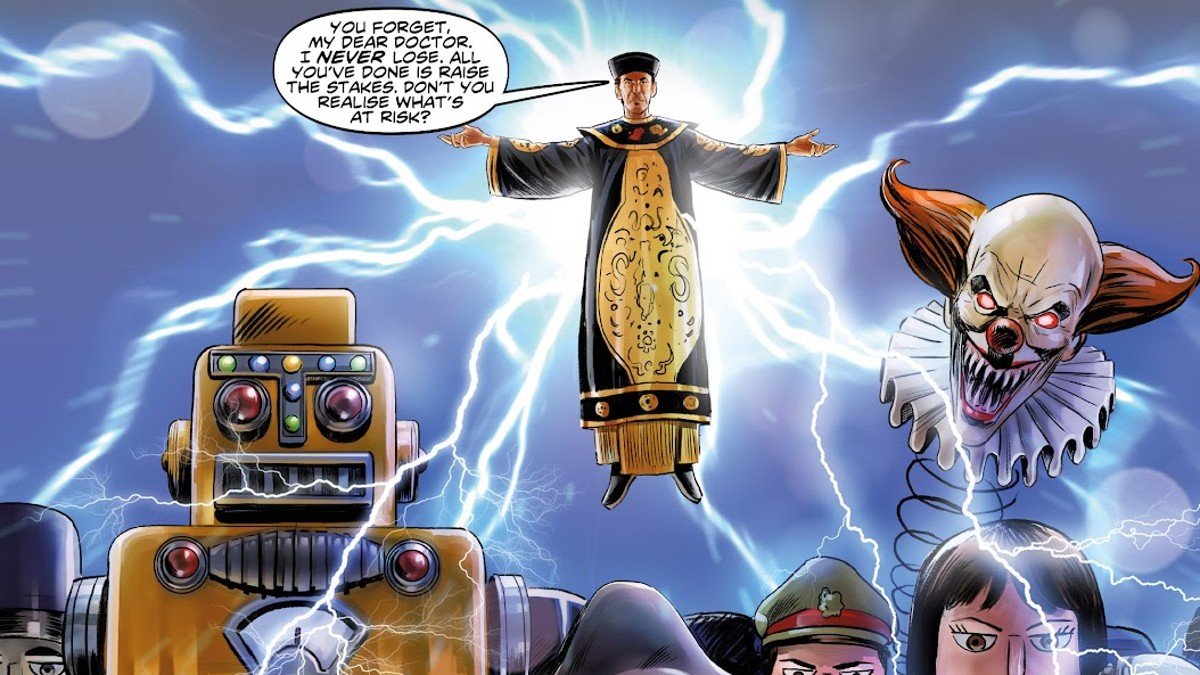
Further cluster bombs to the non-existent Doctor Who canon includes the entire history of The Toymaker, who had previously returned to face the Doctor quite a few times before The Giggle. They met in Endgame and Relative Dimensions in the comics, Divided Loyalties in the books, and, despite missing the TV rematch they were promised thanks to Michael Grade, made the audio and novel cuts of The Nightmare Fair. On top of those, and perhaps the most grievously, is the early John Dorney Big Finish masterpiece Solitaire featuring the Eighth Doctor and Charley as well as the Seventh Doctor adventure The Magic Mousetrap. The Giggle promptly and firmly insists that only The Celestial Toymaker can possibly have taken place, effectively wiping all those stories off the board regardless of how much one bends over backwards. Unless they happened after. They could have happened after, right? He escapes the case and goes back on the Doctor’s timeline to cause havoc. The Doctor doesn’t remember for… reasons. That works… Right!?
On top of that, despite giving due credit to the creators, The Star Beast makes no attempt to help include the original The Star Beast comic within continuity, arguably wiping the first black companion Sharon from the archives. Not so much as a nod to ripples or history repeating itself. I am, of course, on the whole, being flippant and insincere when it comes to Russell’s wanton destruction of Doctor Who continuity. As I said earlier, nothing actually changes those stories. We still have them and we always will. But these are the things we do undoubtedly allow ourselves to get hung up on. Why do I waste so much time worrying about how a current story affects what’s gone before? I suppose it’s because I care about them. But common sense does interject occasionally.
It should come as no surprise, then, and getting back to the point at hand, that one needs to stretch a little harder to remember the numerous adventures that a younger Mel, having already parted ways with Glitz, travelled for some time with the Seventh Doctor and Ace before finally being dropped off once again in the audio medium. Can it be that after her soft betrayal of the Doctor backfired she, sadly, in a down and out state decided to chance herself on ‘sleazy even for the ’80s’ Sabalom Glitz once again? Oh, how sad and how hard that must have been for her to go through. At least she was able to laugh at his alcoholic death in the long run. Bless. And how old is she supposed to be now if he died at 101?!?
Her baffling return not withstanding, and canon moan over for now, I enjoyed seeing her again. With her computing skills finally put to some use, she was arguably more Mel than she’s ever been on screen before. She had good chemistry with both Doctors, and I expect RTD will look to her EastEnders work more than her first Who TV stint to work out how to best use her going forward. Why did he choose her though? Well, one may look to the first Doctor Who story RTD wrote. No, not Rose — no, not even Damaged Goods, but Mind of the Hodiac, a story he wrote and submitted to then producer John Nathan-Turner as an 18-year-old. The non-commissioned script, recently adapted by Big Finish, featured Mel and the Sixth Doctor. It may well be that Russell has a sweet spot for the character for that reason alone. As with many others in this new ongoing line-up I look forward to seeing more of her, particularly with her status as an orphan being pushed. Will we somehow finally get elaboration on that unseen TV story which depicted her first adventure with the Doctor? It’s a story already told in novel form but as I’ve gone to great pains to point out, I don’t suspect that will get in the way too much. Okay, I’ll stop,
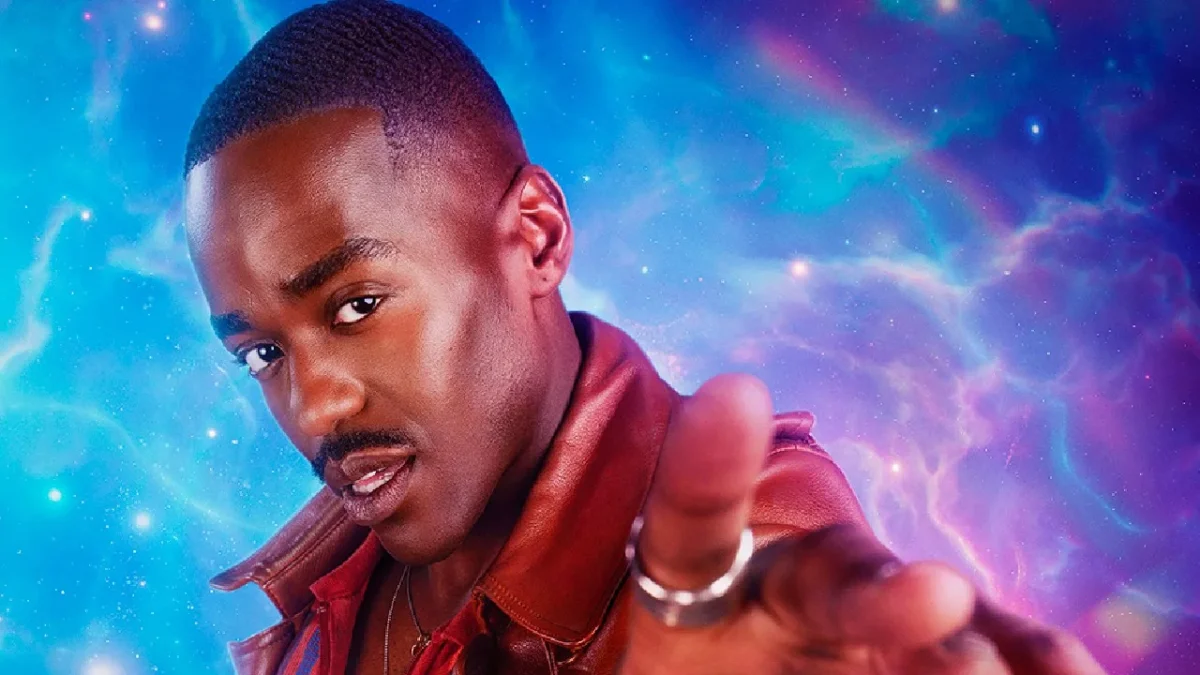
Our new Doctor, Ncuti Gatwa, was spectacular from the off. When the regeneration started, I was thrilled. Finally, a Doctor regenerating halfway through a story, I thought. Who would we credit this story to in the future? And you thought Colin Baker leading the last serial of Season 21 was confusing… Whose face will go on The Collection set?! The weirdness of the initial imagery of the bi-regeneration aside (Ncuti becomes the first Doctor to defeat a villain in his pants), it was a lovely surprise to see the two in action together, sharing the stage. Every line Ncuti delivered was assured and he was as much the Doctor in his opening moments as any has been before, even beating Matt Smith to the punch, despite Smith’s first episode being (in my opinion) the best of all time for proof of concept. He was funny, sassy, emotional, beautiful, giving, and strong, and I cannot wait for another dose.
The bi-regeneration. Right. As I previously noted, I am very happy with the decision to ‘move on’ the Fifteenth Doctor to a fresh start. The consequence of this however is the Fourteenth Doctor’s continued existence. If The Giggle annoyed you, this will probably be the reason why. Not only are there two separate David Tennant Doctors now among us (albeit in different realities) but one is now on present day Earth. Furthermore, if the commentary is to be believed, there are now several other Doctors now roaming around (different realities? Pocket dimensions? Who knows?) due to all the Doctors allegedly now doing the same thing. In other words, RTD has suggested, when the Fourteenth Doctor bi-regenerated, all the Doctors did. So, a Hartnell who didn’t regenerate exists after the Second Doctor now bi-regenerated from him. Versions of Tom and Colin Baker are bashing around somewhere too, post-demise. And a Matt Smith, maybe not for long in that case given that he aged to death. It’s a good get out of jail card for any future appearances but does it make even a shred of sense? It needs a lot of continued thought if you want to be too literal with it. The Doctors we saw in Tales of the TARDIS — yeah, they’re bi-regenerated Doctors. Okay, sure, but hold on, does that mean there were two Doctors at the conclusion of The Caves of Androzani now? That certainly wasn’t within the text of this story or of that all time classic. He (the Fifth Doctor) may have had some words to say about the Sixth’s negative words about him, the treatment of the companion for whom he had just died, and almost definitely about Six’s choice of attire. And which one got to keep the celery when they split in half?
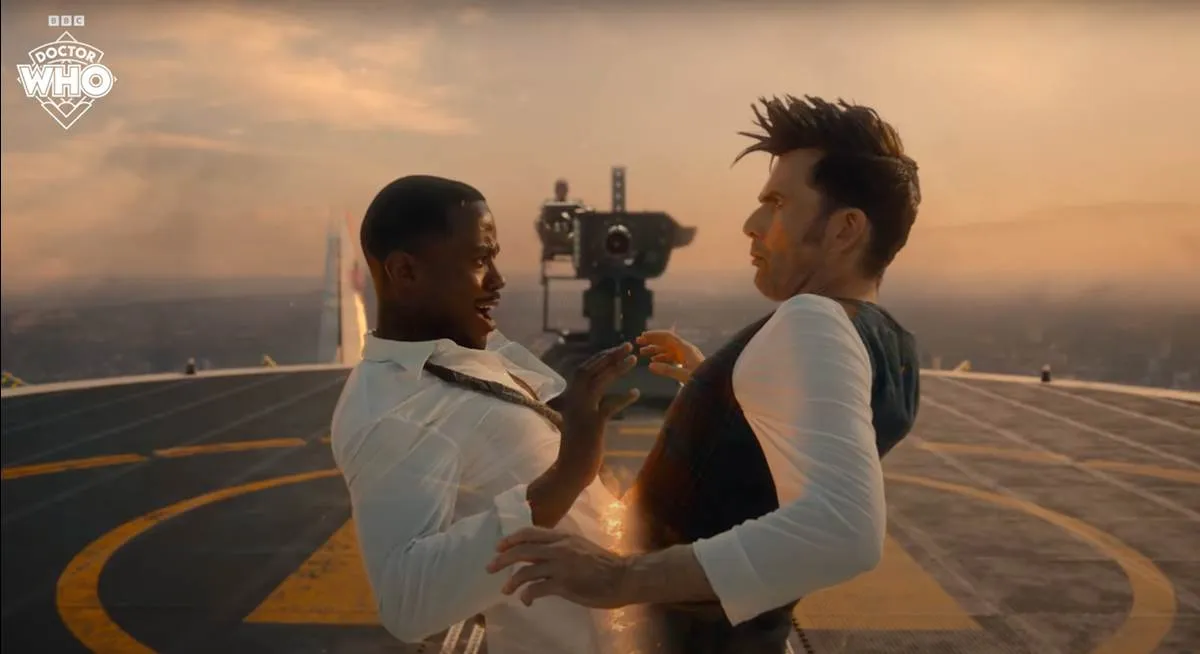
It’s very convoluted and it’s not an idea I like thinking about too much for fear of risking headaches. Also, if that happened every time does that mean that there is not one (Ten), not two (Ten 2, of the hand), not three (actual metacrisis Ten), not four (Ten 3 of his actual regeneration) but five (Fourteen) David Tennants roaming about time and space? Surely that would push even Ten’s ego too far? The world would implode purely from the self-interest! No, it doesn’t bear thinking about. But I doubt it was meant to be. As with The Star Beast’s Donna ‘let it go’ reasoning, and like One More Day, I don’t think creators want us to think too much about these contrived things, but for us to just go with it for the freedom it will allow us to enjoy going forward. Fair enough. Let’s deal with it internally and move forward. Allons y! I’m sure such sound logic will be enough to put the issue to bed for the fandom once and for all.
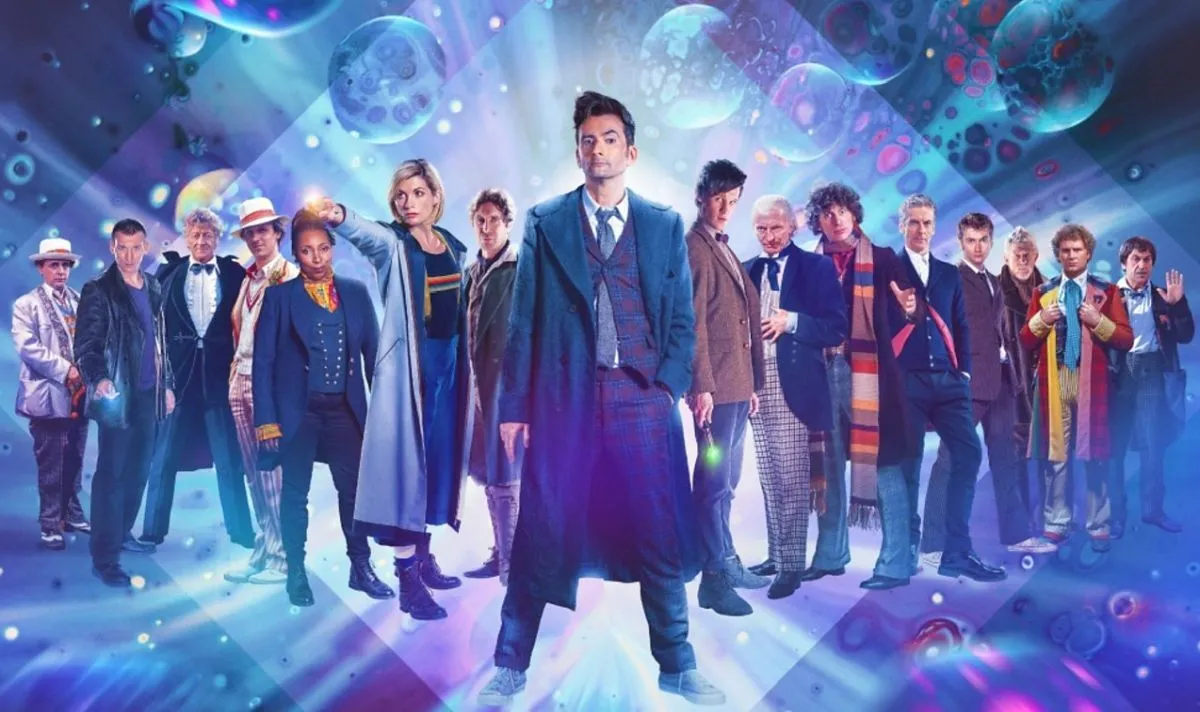
I wouldn’t spend too much time worrying about whether this new version, being considered separate as it is, will be disrespectful of what’s come before. The third special gave us many Easter eggs and references for us to nerd out over if we chose to, and with Mel continuing into the Gatwa era its very clear that this isn’t simply about saying goodbye to the past. Along with classic references to Mavic Chen and obviously the Toymaker himself from the First Doctor’s era, the trial of the Second (or perhaps the Sixth?) Doctor, exile on Earth, the eyebrow communicating Delphons and ‘Here we go again!’ from the Third Doctor, Sarah, the Key to Time, and Logopolis (the Fourth Doctor), Adric (the Fifth Doctor), Mel (the Sixth Doctor), and the Gods of Ragnorak (the Seventh Doctor), we also received mentions of the Time War (the Eighth/War Doctors), Mel’s delivery of the word ‘Fantastic!’, and Fifteenth’s reference to Rose (the Ninth Doctor), Allons-y, Trinity Wells, the Archangel Network, the essence of the Master in an object picked up by a woman and a sort of regen fakeout (the Tenth Doctor), the Pandorica, The Giggle serving as a subliminal message similar to the Silence in Day of the Moon, and River Song (the Eleventh Doctor), an indirect reference to the Doctor being President of Earth when he granted permission to use the weapon (the Twelfth Doctor) and the Flux (the Thirteenth Doctor). On top of that, we had an on-the-nose (and totally valid) criticism of the Moffat companions’ non-deaths through the art of puppetry. I’m sure it wasn’t ill meant but you can admit to yourselves now that those were unsatisfactory endings. Enough time has passed. You can do it. We’re all here for you.
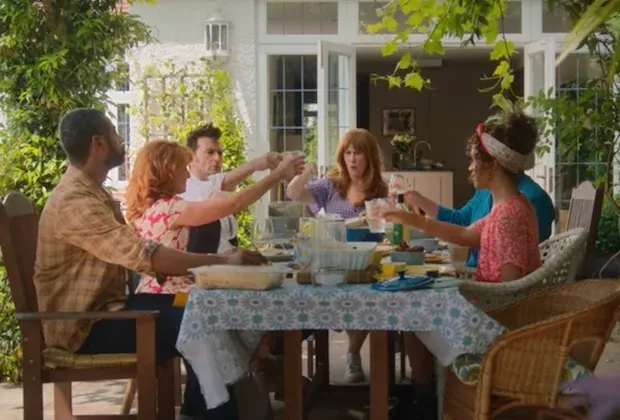
Right. To finally address the elephant in the room. Should there ever be two concurrent Doctors and should the Doctor ever settle down? Firstly, I think you could argue that all the Doctors are existing concurrently all the time anyway. They travel time and happen upon places. They never check in advance to make sure they won’t bump into each other, do they? The reason given for Amy and Rory being irretrievable from the 1940s was that there was too much time travel there in that time and place; at least a decent amount of that is due to the Doctor alone in stories that we’ve already seen. The real issue in this arises through Tennant being a ‘grounded’ Doctor akin to the Third, living in one era consecutively albeit in possession of a working TARDIS this time out. He can use the TARDIS as a holiday home and make short trips but what happens when, as it so often does, Earth is invaded the next time? You get this contrivance in comics and spinoffs all the time. How can we justify the main protagonist not stepping in when the stakes are so high? Where are the Avengers or the Fantastic Four when the Sinister Six have destroyed half of New York with only young Peter Parker to stand in their way? Furthermore, it’s possible that his ‘niece’ (lovely touch by the way) Rose will be returning in the future to star alongside Ncuti and yet is also taking trips to Mars with the Fourteenth Doctor. And Donna may be joining UNIT, should Kate get her way. Why wouldn’t she call on her bestie when the dung hits the fan? Surely the logic of his staying in sub-retirement to process things won’t stand up to the potential destruction of Earth. The main question is will all of this not potentially overshadow the Fifteenth Doctor? I’ll put it this way. We’re all fans of Ncuti and want him to stand by himself. He will. He’s amazing; I’ve never loved a Doctor this early. That’s a fact. I’m itching for more of him and he has nothing to worry about when it comes to being overshadowed. He is magnetic. The potential problems within the story will have answers. Just trust RTD not to be an idiot. He’s done alright so far.
But should the Doctor ever settle down? Probably not. It would be a terrible ending for the show if it were being rested, for example. Different question: should the Doctor ever take some time? I’d refer to a certain Sherlock Holmes spending time with his bees or an Alain Quartermain on his ranch in Africa. They always come back for another story when we need them. The Doctor already has; we’re seeing him: Ncuti Gatwa is that Doctor. I think RTD makes a valid point with his message about the Fourteenth Doctor. The Doctor, and we, have been through so much. The last 18 years have been hard going for a variety of reasons. Many wish the last five of those hadn’t even happened. The Moffat years dragged us through a rollercoaster of barbed wire fences. Some Classic Who fans still don’t see Davies’ relaunch as the same show. It’s time to draw a line. Stop suffering with the Doctor. Stop, as I alluded to earlier, comparing the apparent failures of the present to the past. Nothing will ever beat nostalgia. Just relearn how to enjoy your favourite show again or pick an opportune time to jump off. None of us will ever see the ending, after all. Nor should we. Doctor Who will and should last forever. RTD has given us a perfect excuse, should we need it. Retire with your memories. Retire with your Doctor, even. Nothing will change them or what they mean to you. Doctor Who will never end, but Davis has given the show another very good semi colon with this ‘ending’. The next few episodes will represent a whole new chapter.
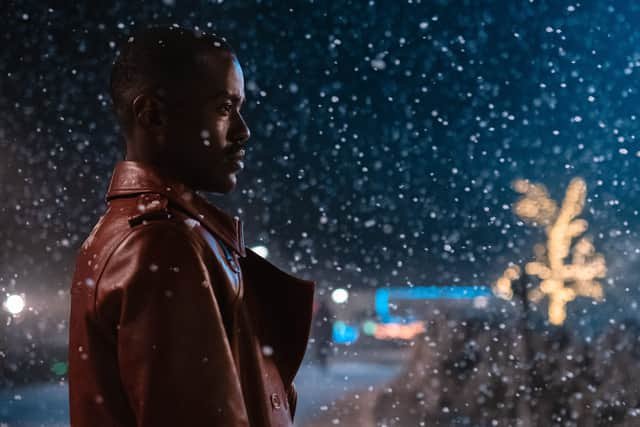
Questions for the future include… (deep breath) who the Toymakers legions are, who the lady who took the gold tooth/Master is, which Master is it anyway, why does it absolutely have to be Ryan Gosling and how devastated will I be if it’s literally anyone else, who is the Meep’s boss, who else did the Toymaker battle and will they return now he’s locked away, who is The One Who Waits, will the 14th Doctor eventually actually regenerate into the Fifteenth Doctor who will then be cast back in time (rehab in the wrong order) or will he be go onto the become The Curator, are there now two different TARDISes or is the jukebox version with wheelchair accessibility just a future version, how do the Guardians and the Eternals fit in to all this, do they even, why are the Goblins singing exposition at us, when will they release The Meep plush toy, how long will the Fifteenth Doctor have been the Doctor when we meet him again, how many outfits will he have in episode one alone and by how much will he beat Pertwee’s costume record by the time Season 1 is all said and done, is Doctor Who a musical now, who is Ruby Sunday, who is Anita Dobson’s character? Okay. Enough to keep us going then. I cannot wait for The Church on Ruby Road!
